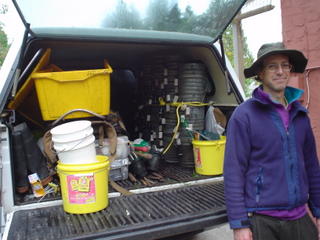Trieste Calling

Yesterday was his birthday, his 42nd birthday. He's our youngest child. As different from his siblings as it's possible to be. Each of our children have eighteen months between them; two boys, one girl. Their environment was similar, our attitudes toward them, our love and protectiveness, our sensitivity to their needs must have been similar, but parents always believe that to be the case. The truth is, we treat each of our children somewhat differently. They have their own inalienable personalities and we respond to those personalities, while loving and supporting them in every conceivable way. When they're happy we are; when they are miserable so are we; when life seems unkind to them we rail against the injustice of it. We love them unconditionally, even though our love sometimes takes a back seat to our perceptions of what they're doing. They have a remarkable facility of loving us back while steadfastly making their own way in the world, armed with the values we've foisted upon them, ready to face their futures, and we hope for the best.
Generational perceptions create barriers, and we can only sit back at times, observe, comment to one another, keep our metaphorical fingers crossed for good luck, and thank a kind fate that has granted us these beings to cherish. They're busy with their very own lives and we're a kind of addendum; there in the background along with their memories of time past as children, but they're pushing on to their future and their daily lives no longer include us, and this is as it should be.
This morning we had a telephone call from a telephone booth outside a huge tourist attraction near Trieste, a city of a quarter-million people. Our son calling. He's bunking in for this week with an Italian friend who used to be one of five-six people living with our son in a rental house in Vancouver. Jordan had borrowed his bicycle and biked out to have a look at this huge natural phenomenon. While we spoke the sonerous peal of church bells rang long and beautifully in our ears; loud, but not that loud it interrupted our conversation.
They'd gone on a week-end mountain-climbing expedition, slept over in an old army installation made over into a mountain hut for climbers. Scattered throughout the mountain, he said, were bits and pieces of rusting armaments, left over from WWII. He had, in fact, visited a concentration camp in Trieste where Italian Jews and Italian partisans had been incarcerated under Nazi occupation, and later presumably incinerated. The weather has been warm, and sunny, although this is northern Italy; actually bordering Slovenia. His friend accompanied him on a day-trip to Venice, and Jordan has decided to return on his own for three days - later this afteroon, in fact.
He'd found Rome to be horribly expensive, even though he stayed over in a hostel, and ate light food. He's returning for a few days, wanting to see the Coliseum and Vatican City, among other places. Before then, though, on his return from Venice, he will try to see if another old friend, an Austrian who had come to Vancouver to study with Jordan a few years ago, and who is now living and working over the border between Italy and Switzerland, can free himself up for a few days of cameraderie.
Jordan's Italian friend with whom he's staying in Trieste, is doing a post-doctorate with an oceanographic institute located near the Adriatic Sea. Jordan mentioned how different he found the bedrock to be, on the mountains, quite unlike what he's accustomed to, around the Rockies and Coastal and Interior Mountains in B.C. Lots of pine, though, and larch, which had already turned bright yellow, although the weather has been mild.
He also said he found people ate differently there. While our supermarkets are full of fruits and vegetables brought from afar, there the produce available is what's grown locally, so everything is the produce of the season. They're more self-sufficient, in that sense obviously, than we are, spoiled by the availability of such a great range of produce, little of which is actually produced where we live. He noted, from Sweden to Rome that there were not overweight people to be seen, let alone the morbidly obese whom we see so often on the streets in North America.
Energy conservation is more of a way of life there, a commitment of necessity. Italian cars are small and neat and zip around all over the place. People are everywhere on scooters, and on bicycles; fewer bicycles in Italy than in Sweden. People drive crazily there, he said, but despite that, he observed that they're good drivers, careful drivers, on the lookout for pedestrians who, from all I've heard, are also crazy in their disregard for safety, through road-crossings. Zipping about in their small cars on often too-narrow streets (reflecting the fact that these are very old places) drivers are not averse to driving up onto curbs and sidewalks to speed up their passage in the always-heavy traffic.
Speaking with him was wonderful, we each peppered him with questions and undoutedly kept him on the line too long. Receiving emails from him has been rather wonderful too; from Sweden, from Rome, but there's nothing quite like hearing the voice of a loved one over a geographic distance.

<< Home